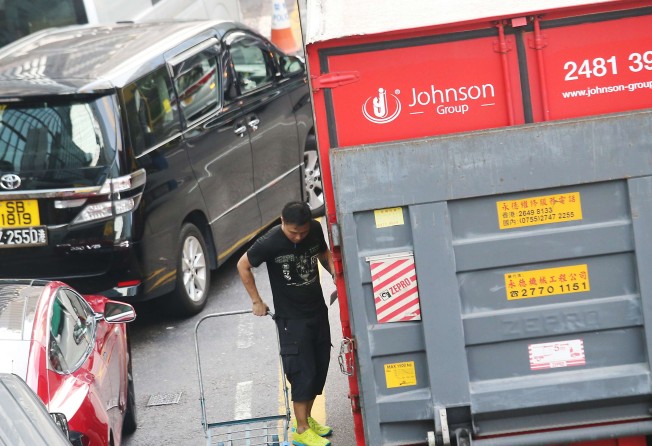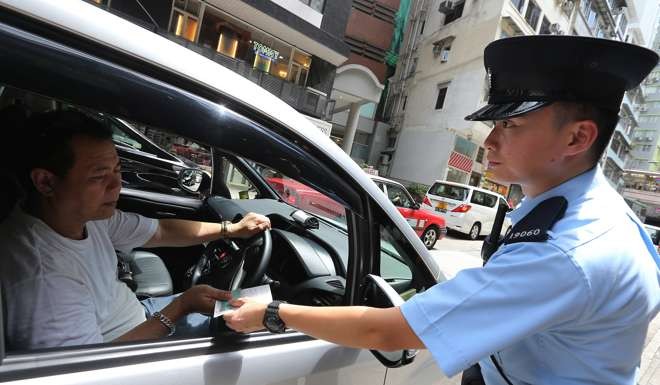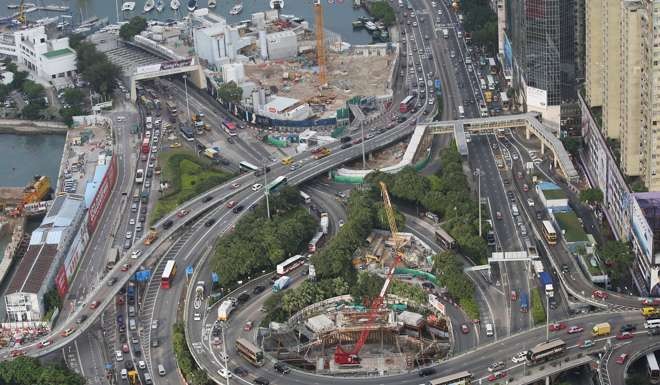Hong Kong must target private cars to stop the city grinding to a halt
Ian Brownlee says chronic gridlock is eroding the city’s edge and calls for immediate action, such as pricing out private cars as a transport option and more efficient road pricing

One of Hong Kong’s major competitive advantages over other Asian cities was that it was easy to get around and attend three or four business meetings a day. That is rapidly disappearing and we are becoming just another congested Asian city.
The administration of Chief Executive Leung Chun-ying has requested suggestions for the coming policy address and budget. The government must address traffic congestion and make better use of roads in the public interest, while at the same time increasing revenue.
Illegally parked private cars occupy kerbsides, leaving vehicles unloading goods to block traffic lanes. It is taking longer for buses to complete their trips, and taxis taking short cuts to avoid the gridlock are now jammed by others seeking a free-flowing route.
In December 2014, the Transport Advisory Committee released a “Report on the Study of Road Congestion in Hong Kong”, analysing transport data and a public opinion survey. The introduction said: “If we do nothing to contain congestion, it will continue to erode the environment, sustainability, quality of life and competitiveness of our city. Immediate action is warranted.”
The report presented a number of realistic suggestions – none have yet been implemented.
The main problem identified was the uncontrolled growth in the size of Hong Kong’s vehicle fleet, which went from 524,000 in 2003 to 681,000 in 2013, up by an alarming 30 per cent. Road infrastructure cannot be increased to accommodate a continued growth of vehicles at this rate.

With private cars and their inefficient road use being a major culprit, recommendations were made to drastically restrict their growth, mainly through pricing. The public opinion study showed that 60-70 per cent supported restrictions on private car growth, as these were seen as a luxury. The study concluded that reducing the private car growth rate, from about 4.5 per cent per year to about 1.5 per cent, could drastically cut both journey times in urban areas and greenhouse gas emissions.
High levels of congestion have spread well beyond the traditional areas of Central and Tsim Sha Tsui
However, the number of private cars increased by 4.5 per cent in 2014 and 4.8 per cent in 2015. In the 12 months since November 2015, the number of registered private cars grew by 17,000 to 567,886.
High levels of congestion have spread well beyond the traditional areas of Central and Tsim Sha Tsui. Major delays are seen at the ends of the expressway system in Mong Kok and Kwun Tong, which do not have adequate road space for the vehicles trying to get there. This is where businesses are directly affected. Congestion is now common in more remote areas such as Yuen Long and Sai Kung.
The study identified two major action areas and they are more relevant than ever. The first is managing the private car fleet size; the second, efficient use of the limited road space.
An urgent stop to the rapid increase in new private cars can best be achieved by pricing them out of the transport options. This can be done by raising the first registration tax on new cars by 100 per cent, to apply equally to all private cars, whether environmentally friendly or electric. The annual license fee has not been increased for 20 years.
The tax on petrol should also be increased by at least 50 per cent, which can act as a major deterrent. For company cars, the depreciation allowance must become negligible so that a car is not a tax break.

To manage road space better, the existing technology should be used in a smart way. The proposed Electronic Road Pricing scheme for Central will be too late and irrelevant, as extreme congestion will have extended to other areas before it is introduced. We already have two existing road pricing cordons which are not recognised as such.
The cost of parking at on-street meters is ridiculously low at HK$2 for 15 minutes
The t hree cross-harbour tunnels, the bridges to Lantau and the tunnels connecting Kowloon to the New Territories charge tolls. These should be priced to control congestion and reduce use by private cars. Tolls on taxis and public transport could be reduced, and tolls on private cars increased by at least 100 per cent during peak hours. Technology allows for off-peak tolls on private cars to be reduced as congestion is reduced. All tolls across a cordon should be the same, unless a differential can be introduced to manage congestion.
The cost of parking at on-street meters is ridiculously low at HK$2 for 15 minutes. The charge should be similar to that for off-street parking in the area. This could go up to around HK$30 per hour for cars in congested areas, but less in remote locations.
Ownership and use of private cars in Hong Kong is an unnecessary privilege
Finally, fair and equal enforcement of traffic and parking laws is important. Blatant use of no-parking areas or no-waiting areas leads to congestion, abuse of traffic laws and driver conflict. Compliance with traffic laws is a major public concern and more police and traffic wardens need to be on the beat.
The police have supported an increase in the fixed penalty fines for parking offences so that they are a real deterrent. The present HK$320 was fixed in 1994 and is effectively a cheap parking charge. Raising it to at least HK$1,000 may have an impact.
Other things can be done to reduce congestion, but reducing the total number of private cars and almost eliminating their use during peak times will ensure that our road-based public transport can operate better. Ownership and use of private cars in Hong Kong is an unnecessary privilege which should not frustrate public transport and essential commercial traffic.
Ian Brownlee is managing director of Masterplan Limited, a planning and development consultancy